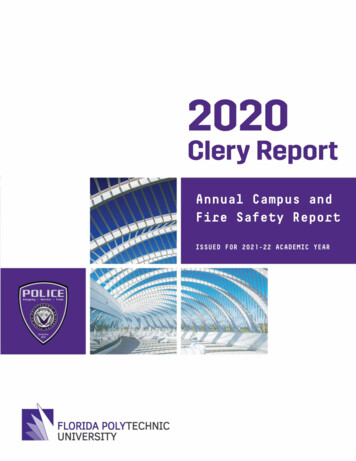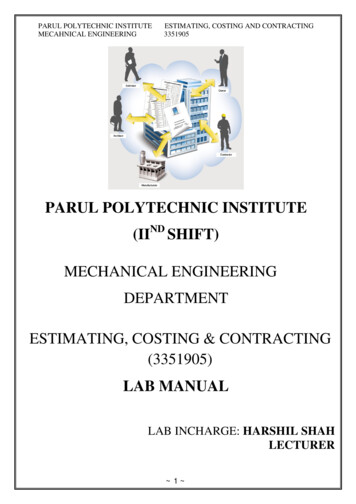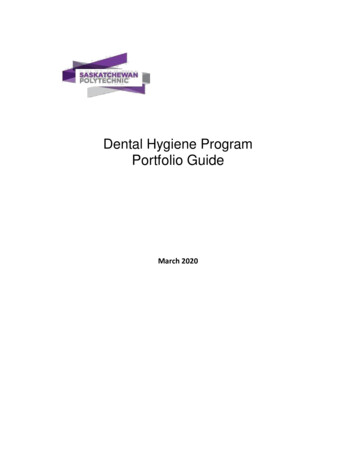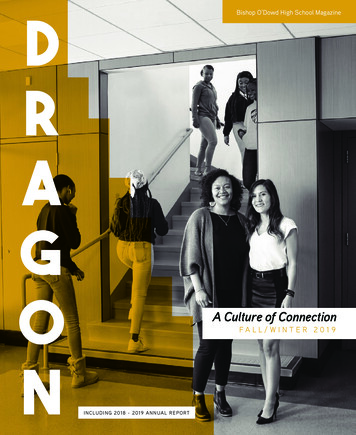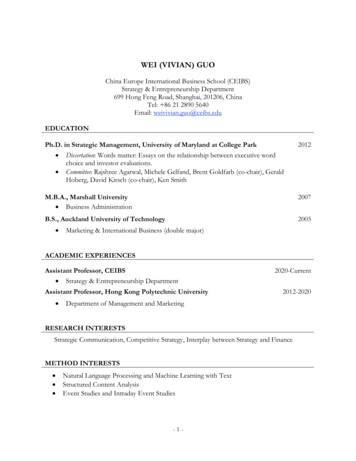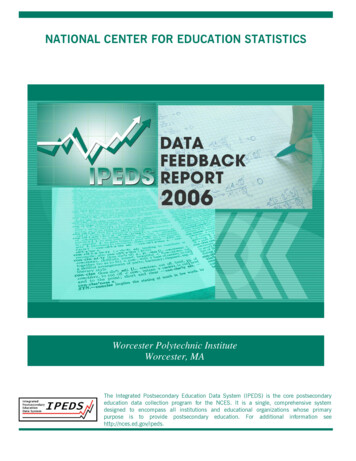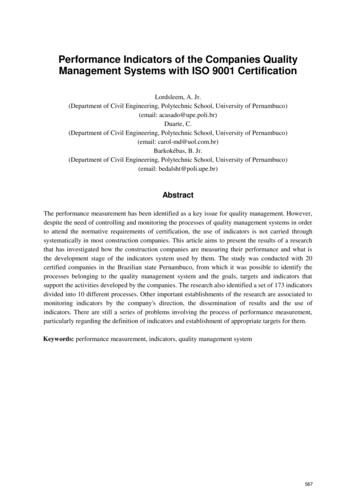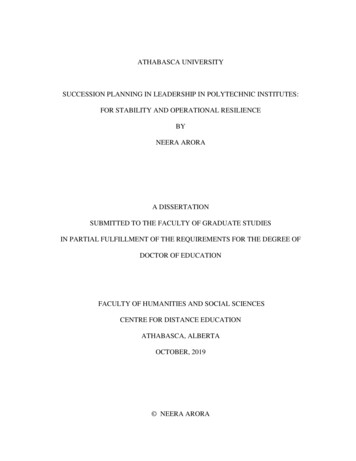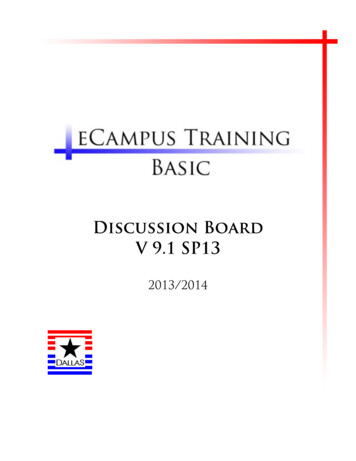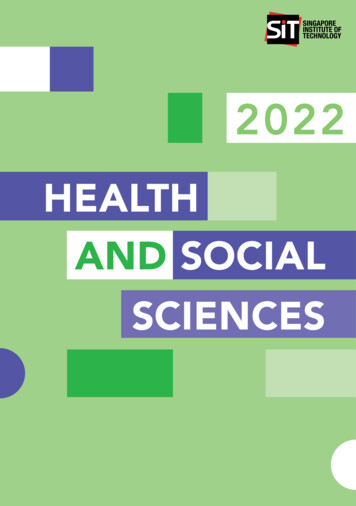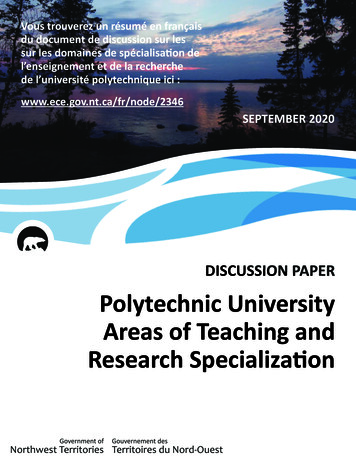
Transcription
Vous trouverez un résumé en françaisdu document de discussion sur lessur les domaines de spécialisaƟon del’enseignement et de la recherchede l’université polytechnique ici :www.ece.gov.nt.ca/fr/node/2346SEPTEMBER 2020DISCUSSION PAPERPolytechnic UniversityAreas of Teaching andResearch SpecializaƟoni
iiDepartment of EducaƟon, Culture and Employment
CONTENTS1. INTRODUCTION. 1WHAT ARE AREAS OF SPECIALIZATION? . 2WHY ESTABLISH AREAS OF SPECIALIZATION?. 2STRUCTURE OF THE DISCUSSION PAPER . 32. BACKGROUND. 4AURORA COLLEGE FOUNDATIONAL REVIEW. 4WHAT IS A POLYTECHNIC UNIVERSITY? . 4ENGAGEMENT TO DATE . 53. GUIDING PRINCIPLES . 64. CHARACTERISTICS OF SUCCESS . 75. PLANNING AREAS OF SPECIALIZATION . 9ENSURING AN EFFECTIVE, EFFICIENT AND SUSTAINABLE INSTITUTION . 9SUPPORTING NORTHERN SOCIAL AND ECONOMIC DEVELOPMENT. 106. PROPOSED INITIAL AREAS OF SPECIALIZATION . 12SKILLED TRADES AND TECHNOLOGY . 12MINERAL RESOURCE AND ENVIRONMENTAL MANAGEMENT . 14NORTHERN HEALTH, EDUCATION AND COMMUNITY SERVICES . 16BUSINESS AND LEADERSHIP . 187. STUDENT PATHWAYS . 208. CAMPUS AREAS OF SPECIALIZATION . 209. NEXT STEPS . 21PHASED APPROACH TO TRANSFORMATION . 21APPENDIX A: ADDITIONAL RESOURCES . 22iiiiii
ivDepartment of EducaƟon, Culture and Employment
1.INTRODUCTIONThis discussion paper outlines proposed initial areas of teaching and research specialization forthe polytechnic university. The four proposed areas are based on a set of measures that guidetheir development. Specializations at any post-secondary education (PSE) institution naturallyevolve, and what is presented here is a proposed starting point of areas of teaching and researchspecialization for the polytechnic university. Over time, the polytechnic university will re ine andexpand these areas of specialization.Aurora College is currently focused on making foundational changes to ensure academic excellence.Part of that work will include development of a formal Academic Plan for Aurora College to supportbroader shifts in the strategies, processes and culture underlying academic excellence. While areasof specialization are a basis for planning for the new polytechnic university, they will increasinglybecome apparent in many of the improvements to Aurora College made through the transformationprocess. It is important to also note that, while areas of specialization will guide programmingdecisions and shape their design and delivery, they do not explicitly dictate what programs will beoffered. Programming decisions require further engagement and analysis.As highlighted in the Government Response to the Findings and Recommendations of the AuroraCollege Foundational Review (Government Response), the transformation of Aurora College into apolytechnic university represents a signi icant organizational change that will create a new rangeof opportunities for prospective students and the territory as a whole. Although the term “teaching”is used throughout this paper, the transformation is really about a renewed focus on teaching andlearning. Understanding and responding to the learning needs of students will remain the corebusiness of the polytechnic university, and the growth of research programs at the institution willenhance the learning experience. Campuses and community learning centres will continue to meetstudents where they are in their education journey, including academic upgrading and accessprograms.In the past, striving to be “everything to everybody” has limited Aurora College’s potential.The polytechnic university must focus its planning and resources around clearly understoodareas of specialization, or it will struggle to increase access to quality programming for studentsand support cutting-edge applied research programs. Establishing areas of specialization will helpthe polytechnic university be effective, ef icient and sustainable.In presenting the proposed initial areas of specialization for the polytechnic university, thispaper includes examples of teaching, careers and research. The examples establish a commonunderstanding of what could be achieved under the proposed areas of specialization and provide abasis for wide-ranging engagements that will shape programming decisions. As part of thetransformation, Aurora College is developing a clear set of policies and processes to guideprogramming decisions.The four goals of the discussion paper are to:1. Explain how the proposed initial areas of specialization have been identi ied;2. Propose a focused set of robust and clearly de ined areas of specialization;3. Help key partners and stakeholders understand the potential for growth within theproposed areas of specialization; and4. Receive feedback from partners and key stakeholders on the proposed areas of specialization.1
What are areas of specialization?Areas of specialization are at the core of a PSE institution’s identity. They signal the institution’steaching and research focus to current and prospective students, educators, researchers, fundersand partners.Every post-secondary institution is unique. Areas of specialization help distinguish institutions,their contributions to knowledge, and their scope of learning opportunities. These may beexplicitly stated in the vision and mission of an institution, or may be embedded in other strategicdocuments. They should always exist for the overall institution, but may also exist at otherlevels, including for different campuses.It is normal for PSE institutions to regularly undergo a strategic planning process that reviewsareas of specialization, and Aurora College is nearing completion of its own three-year strategicplan. However, as part of the broader transformation of Aurora College into a polytechnicuniversity, the process of deciding on initial areas of specialization has particular importanceand is being addressed directly in its own document that is expected to be released in fall 2020.Input received in response to this discussion paper will inform that document and the continuedre inement of areas of specialization.Changes to the organizational structure will be informed by the areas of specialization, but thetwo should not be confused. Areas of specialization are not silos; there is great potential forteaching and research programs that intersect one or more areas of specialization.Why establish areas of specialization?Areas of specialization help guide decision-making and the allocation of resources within theinstitution to ensure it remains effective, ef icient and sustainable. Areas of specialization guideprogramming decisions and shape the design and delivery of those programs. Having clearlyunderstood areas of specialization also provides a frame for communicating successes within theinstitution.Institutions that try to be everything to everybody do not excel in any particular area. This canresult in a declining reputation and loss of con idence among prospective students, partners,stakeholders and funders.Areas of specialization are continuously evolving. A successful PSE institution must regularlyre-examine its focused investments in teaching and research to ensure it is responsive toopportunities and risks.2Department of EducaƟon, Culture and Employment
Structure of the discussion paperThe overall structure of the discussion paper guides the reader through the development andbene its of the proposed initial areas of teaching and research specialization for the polytechnicuniversity.Section 2 (Background) begins with a brief overview of Aurora College, the transformationprocess and how engagement to date informed this discussion paper and will continue to bea key element of the transformation.Section 3 (Guiding Principles) proposes principles to guide the selection of areas of specializationfor the polytechnic university.Section 4 (Characteristics of Success) highlights characteristics of a successful PSE institutionthat will be priorities in the establishment of areas of specialization for the polytechnic university.Section 5 (Planning Areas of Specialization) provides information on the series of measures thathave been used for the selection of initial proposed areas of specialization.Section 6 (Proposed Initial Areas of Specialization) details the proposed initial areas ofspecialization for the polytechnic university and provides a basis for further engagement.Section 7 (Student Pathways) reinforces that the polytechnic university will have a place for everyresident who seeks an opportunity to further their skills, knowledge and abilities through PSE.Section 8 (Campus Areas of Specialization) explains how the initial proposed areas ofspecialization are for the polytechnic university as a whole; it is expected that eventually eachcampus will take a leadership role in the delivery of one or more areas of specialization.Section 9 (Next Steps) outlines the overall transformation process and how the development ofinitial areas of specialization will contribute to the process.3
2.BACKGROUNDAurora College is a public college in the Northwest Territories (NWT) and is mandated to deliver abroad spectrum of PSE programs to meet the needs of individuals, communities and the labourmarket. This includes the delivery of university-level programs, and granting of prescribeduniversity degrees and applied bachelor degrees by university partners.As the research division of Aurora College, the mandate of the Aurora Research Institute (ARI) is toimprove the quality of life for NWT residents by applying scienti ic, technological and Indigenousknowledge to solve Northern problems and advance social and economic goals.Aurora College programs and services are delivered through three campus locations and21 community learning centres.Aurora College Foundational ReviewAurora College underwent a Foundational Review between 2017 and 2018 that concludedwith the Government Response. The Government Response agreed with the recommendationthat addressing current gaps in performance and addressing untapped opportunities requiresthe transformation of Aurora College into a polytechnic university. It proposed that such atransformation would lead to the delivery of world-class programming and transform the Collegeinto a destination university in the North and for the North. More Northerners will be able todevelop skills needed for the Northern jobs of the future, and will be able to do so in the NWT.Establishing a polytechnic university will have an added bene it of mitigating the economic lossthat results from students leaving the NWT to study in other Canadian PSE institutions. Asthe new polytechnic university matures, students from other provinces and territories will beincreasingly drawn to unique learning opportunities in the NWT, as it becomes recognized as“the place to be” for de ined areas of specialization.The path forward for Aurora College continues to be grounded in the commitments made in theGovernment Response, and the timelines and critical milestones in the transformation will befurther articulated in an Implementation Plan that is anticipated for release in fall 2020.What is a polytechnic university?Generally, a polytechnic university combines the practical approach of a college education and thedepth of study usually associated with a university program. Polytechnic programs are skillsintensive and technology-based. Hands-on learning opportunities provide students with practicaltraining for in-demand jobs. Program and curriculum decisions at polytechnic universities arealso made in close collaboration with industry, ensuring graduates attain skills that are relevantto the current job market. It will also continue to offer adult basic education and access programsthat help to ensure accessibility. The polytechnic university will have a place for every residentwho seeks an opportunity to further their skills, knowledge and abilities through PSE.The proposed initial areas of specialization for the polytechnic university build on the workdone at Aurora College, but much change is needed to ensure long-term success in these areas.4Department of EducaƟon, Culture and Employment
The transformation of Aurora College into a polytechnic university represents a signi icantorganizational change that will create a new range of opportunities for prospective students andthe territory as whole.Teaching at a polytechnic university is grounded in applied learning. Students start with afoundation in practical knowledge and then move beyond the theoretical to test what they havelearned. The new institution would continue to focus mainly on applied and technical programs,as has been the case with Aurora College in the past, but with a wider range of credentials andquali ications available to students. At polytechnic institutions, students have the opportunityto bridge certi icate and diploma credentials into bachelor’s degrees, allowing for a great deal oflexibility within a de ined range of academic programs. The teaching and research will be gearedtoward the evolving needs of regional, territorial, national and global employment markets.Research at a polytechnic university is often described as “applied research”. This means usingscienti ic processes and knowledge to achieve a practical or useful result. This approach guidesdecisions about how research is supported under each area of specialization.Engagement to dateThe process of transforming Aurora College into a polytechnic university builds on four years ofengagement with Indigenous governments, communities, post-secondary stakeholders, industryand other stakeholders. These engagements have been an essential part of the GNWT’s wideranging work to strengthen the post-secondary education system and advance priorities suchas establishing a polytechnic university.Over the past four years, direct and indirect input supporting transformation has come fromengagements during the development of the Aurora College Foundational Review Report, theGovernment Response and the NWT Post-Secondary Education Strategic Framework 2019-2029,as well as during the legislative process leading to completion of the Post-SecondaryEducation Act. Aurora College is near completion of a new three-year strategic plan thatincorporates input from Aurora College employees, Indigenous and community leadership,and stakeholders.These engagements have included town hall meetings in campus communities, in-person andtelephone interviews, and online surveys. A speaker series on PSE hosted in conjunction with thedevelopment of the Post-Secondary Education Strategic Framework allowed stakeholders andmembers of the public the chance to share their vision and ideas for the future. The need for areasof specialization was identi ied in these prior engagements, along with how they will contribute tothe success of the institution and its students.Engagement is ongoing and will continue to shape various aspects of the polytechnic university.Sharing this discussion paper is another engagement opportunity and supports informed feedback on the initial areas of specialization for the polytechnic university.5
3. GUIDING PRINCIPLESEstablishing areas of specialization signals the institution’s teaching and research focus tocurrent and prospective students, educators, researchers, funders and partners. In the contextof transformational change, the process of deciding on one or more areas of specialization isparticularly signi icant as it will, in turn, help to shape broader changes to the institution’sstrategy, operations and culture.In determining a process of selecting proposed initial areas of specialization it is helpful toconsider the principles guiding the selection of these areas. The following principles are universal,but identifying them in the context of the Aurora College transformation can establish a commonunderstanding of what areas of specialization mean to the polytechnic university.EffectivenessThe polytechnic university should strive to be effective in meeting the needs of those itserves. Effectiveness is about achieving positive outcomes, but also about successfullymeeting or exceeding expectations. This may be achieved by focusing on teaching andresearch excellence within de ined areas of specialization.EfϔiciencyIncreased focus on clearly de ined areas of specialization should ensure the overallef iciency of the polytechnic university. This includes increased capacity to makeoperational decisions in line with the areas of specialization that maximize bene itsfrom a limited supply of resources.SustainabilityIncreased focus on clearly de ined areas of specialization should ensure the sustainabilityof continuous improvements to the polytechnic university. This includes the capacity toassess and respond to the opportunities and risks facing PSE institutions.TransparencyClearly de ined areas of specialization provide a basis for monitoring and reporting onthe institution’s success. This increases transparency and results in relevant and timelyinformation being made available to the public.AccountabilityClearly de ined areas of specialization will draw support from funders and co-investmentpartners, and set expectations among students and staff. As such, they should become ameans of evaluating the leadership at the polytechnic university by linking decision makingwith success in the de ined areas of specialization.ResponsivenessIncreased focus on clearly de ined areas of specialization should increase theresponsiveness of the polytechnic university to emerging opportunities and challenges.This includes the capacity to monitor and respond quickly to changing social and economiccircumstances across the territory. Such responses could, in turn, include a strategic changeto the areas of specialization.6Department of EducaƟon, Culture and Employment
4.CHARACTERISTICS OF SUCCESSThere are a wide range of characteristics of an effective, ef icient and sustainable PSE institution.The following are common features of successful PSE institutions across Canada and internationally.Sense of identityAreas of specialization enrich the character of an institution by strengthening its identity.The polytechnic university’s areas of specialization will apply across the institutionincluding each of the three campuses and network of community learning centres.Continuous Quality ImprovementThe capacity for continuous quality improvement (CQI) is an essential feature of anymodern PSE institution. It is a quality management philosophy that encourages allemployees to continuously re lect on what can be done to improve ef iciency, effectivenessand the ability to remain responsive and sustainable. It emphasizes incremental andcontinuous steps toward improvement rather than big changes.Clear areas of specialization are essential to CQI. Areas of specialization inform decisionsaround the allocation of resources and help set targets for the development and growthof the institution; for instance, the relative importance of speci ic academic and researchprograms that align with the areas of specialization.Increased student enrolmentAs the new polytechnic university matures, more students from the NWT and from acrossCanada and the world will be increasingly drawn to the unique learning opportunities as itbecomes recognized as “the place to be” for de ined areas of specialization.Being competitive in attracting students requires a strong sense of identity that willdemonstrate the bene its of attending a polytechnic university in the NWT. Graduates ofthe polytechnic university, having gained a life-long association with the institution, willforever share in that identity and carry it with them throughout their careers.Qualiϔied facultyThe polytechnic university must continuously attract new faculty. Quali ied andcareer-minded faculty will look for teaching and research opportunities that they canidentify with and that create opportunities to demonstrate excellence in their chosen ields.Increase the range of qualiϔications offeredFocusing on areas of specialization will enable the polytechnic university to offer a greaterrange of certi ications and quali ications to prospective students. Consistent investments ina small number of areas will provide a strong foundation for the growth of programming.Growth is not sustainable if the institution is constantly shifting its teaching and researchpriorities and investments.Within an area of specialization, the polytechnic university will be able to build up a baseof infrastructure, faculty and resources. This base will support a range of access, upgrading,7
certi icate, diploma, undergraduate degree, graduate degree and potentially post-graduatedegree programs in an effective, ef icient and sustainable manner.Attract co-investment partnersPotential co-investment partners include any organization interested in working withthe polytechnic university to advance its own priorities related to teaching and research.Co-investment partners may be federal, territorial, Indigenous or community governments,industry or businesses, or other PSE institutions.Potential co-investment partners are drawn to institutions that have clear areas ofspecialization and are able to demonstrate excellence in these areas. Co-investmentpartnerships that advance teaching and research at the polytechnic universitycontribute knowledge, expertise, human resources, facilities, equipment or funding.8Department of EducaƟon, Culture and Employment
5.PLANNING AREAS OF SPECIALIZATIONThrough multiple engagements over the past four years, it has become clear that there arewide-ranging views on what should be the teaching and research priorities for the polytechnicuniversity. In order to establish a strong starting point for the polytechnic university, thetransformation process is integrating input from the GNWT, Indigenous governments, industryand the public into a structured approach to planning the proposed initial areas of specialization.A series of measures for the selection of areas of specialization have helped the GNWT navigatethis aspect of the transformation process. These measures are divided into two groups:(1) ensuring an effective, ef icient and sustainable institution; and (2) supporting Northern socialand economic development.Ensuring an effective, efϐicient and sustainable institutionCollectively, this irst set of measures looks inward to the existing assets and structures of theinstitution that are needed to support proposed initial areas of specialization. Success means thepolytechnic university has the inancial and human resources, partnerships and infrastructure tosustain the development and growth of teaching and research in the areas of specialization.The polytechnic university will continue to develop and grow after the transformation processis complete. However, the starting point for the polytechnic university is Aurora College. As such,the existing assets and structures of Aurora College are key considerations in developing areas ofspecialization. More speci ically, when considering the acceptability of prospective areas ofspecialization, consideration must be given to the following.Interdisciplinary teaching and research - The long-term growth and development ofthe polytechnic university will bene it from teaching and research that embodies aninterdisciplinary approach. This requires areas of teaching and research specializationthat are, to some extent, complementary or overlapping.Students will specialize in a subject area, but will learn that subject from a number ofdifferent academic disciplines that integrate various perspectives into their knowledge base.Similarly, research collaboration across areas of specialization will strengthen and enhanceprojects by fostering innovation and creating more robust knowledge.Current and anticipated ϔinancial support - The polytechnic university requires theappropriate level of funding to provide quality post-secondary education. This includesthe availability and applicability of GNWT base funding allocated to the institution. Externalfunding opportunities are also a consideration and include past, current or prospectiveteaching, research and infrastructure contributions.It is important to emphasize that increases in funding will depend on the institution’s abilityto meet the needs or requirements of co-investment partners, be they federal, territorial,Indigenous or community governments, industry or other organizations. As such, areas ofspecialization should remain broadly responsive to the priorities of these partners.9
Existing and anticipated infrastructure – In order to be sustainable, the polytechnicuniversity will need to have the facilities and infrastructure to support the operationalrequirements of teaching and research programs. This means that the institutionwill need to have classrooms, labs, shops, social engagement areas, research and ieldresearch spaces, and libraries appropriate to the areas of specialization.Human resource capacity – The polytechnic university must attract, develop and retainfaculty and staff with the necessary quali ications, knowledge and experience. AuroraCollege’s current staff will continue as an important and valued part of the polytechnicuniversity. The institution will, of course, establish new kinds of positions and somepositions will change. However, there are realistic limits to the rates of human resourcechange and growth that can be achieved. The transformation process must take theseinto account when planning areas of specialization.Partnerships – The institution has or anticipates partnerships with the federal, territorial,Indigenous or community governments, industry and PSE institutions that will shapeopportunities for growth.Supporting Northern social and economic developmentCollectively, this second set of measures looks outward to local, regional and territorial needs.Success means the polytechnic university is equipped to recognize and respond to these needs.When areas of specialization are in alignment with these needs, the institution can engagefederal, territorial or Indigenous governments, communities, industry and other stakeholdersin meaningful dialogue around potential teaching and research programs and co-investmentopportunies.NWT labour market demand – In order to support economic growth and diversi ication,the polytechnic university must contribute to the evolving labour needs of NWT employers.In 2015, the GNWT released the Labour Market Forecast and Needs Assessment. Thisdocument provides a socio-economic pro ile of the NWT along with an economic outlookand occupational demand forecast for workers up to the year 2030.NWT knowledge economy – In a very basic sense, growing the knowledge economy isabout leveraging the long-term economic gains from creating, storing and disseminatingknowledge. As the only public post-secondary education institution based in the NWT, thepolytechnic university will become a central part of the NWT’s knowledge economy. Areas ofspecialization will provide a basis for broader partnerships, increasing the opportunities forgrowth of the knowledge economy and complementing other GNWT investments.GNWT Knowledge Agenda – The Knowledge Agenda: Northern Research for NorthernPriorities provides overarching guidance for science funders and researchers on theresearch priorities of the GNWT. It is used by the GNWT to promote and initiatecollaboration with researchers for the mobilization of scienti ic, traditional and localknowledge. As a whole-government document, the Agenda articulates GNWT researchneeds across departments and focuses efforts and directs research in the Northern interest.10Department of EducaƟon, Culture and Employment
Northern knowledge transfer – By focusing on particular areas of specialization,the polytechnic university will capitalize on the many forms of knowledge and waysof knowing in the NWT. It must be prepared to use that to strengthen communitiesand bene it economic and social development at the territorial, regional andcommunity levels.Geographic advantage – The value of place includes consideration for the speci icgeographic and environmental conditions that contribute to unique learning andresearch opportunities.Cultural responsiveness – The value of culture includes consideration of local cultures andtraditional hi
What is a polytechnic university? Generally, a polytechnic university combines the practical approach of a college education and the depth of study usually associated with a university program. Polytechnic programs are skills-intensive and technology-based. Hands-on learning opportunities provide students with practical training for in-demand jobs.
